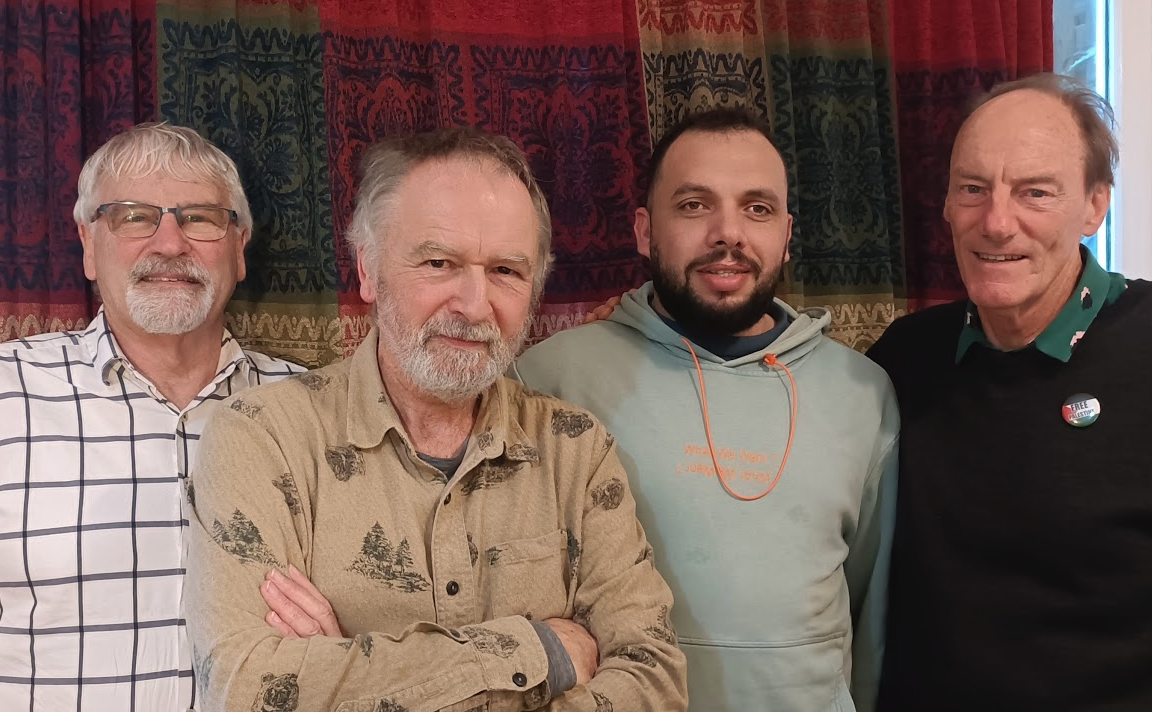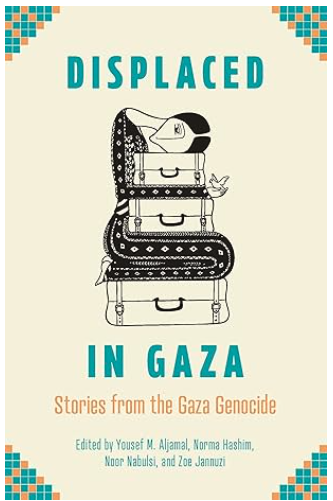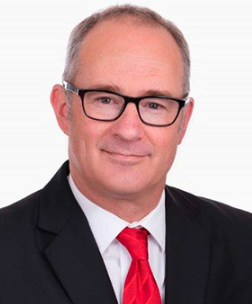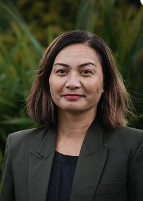Yousef Aljamal. The war on memory, and writing through a genocide.
Sitting opposite me in my black leather captain’s chair, looking more like a bouncer than a writer, was Yousef Aljamal, co-author of Displaced in Gaza – stories from the Gaza Genocide. His eyes had the strangest mix of distance, sadness, humour and intelligence. I asked my first question. He just looked at me. He said nothing.
I know his writing; he is a fine writer. That’s what I asked about first: “I see writing as fighting. Is that how you see it?” After an awkward pause (I think he was assessing me), he said:
“I see writing as an act of resistance, because in times of oppression and injustice, writing is a means of fighting back and resisting, but also documenting and remembering and healing.“
Photo: Don Carson, Eugene Doyle, Yousef Aljamal and John Minto.
The war on memory
Yousef, a Palestinian refugee from Gaza, currently living in Turkey, is Coordinator at the Palestine Activism Program at the American Friends Service Committee (AFSC). He holds a doctorate in Middle Eastern Studies. In 2023 Israel targeted and killed his friend and mentor Refaat Alareer, one of the great storytellers of Palestine (which is precisely why he was targeted).
With Israel having killed more writers and journalists than any regime in history, Yousef has a vital role to play.
“When there is a war on our memory, writing and documenting is the way to keep the memory alive. There are many stories that have been lost throughout history because they have not been documented. I've seen this in the Maori history in this country. So it's very important that we keep the memory alive and we document the stories of people on the ground in Palestine who have been subjected to Nakba all the way to today, where a genocide is unfolding in Gaza.”
Yousef personalises the most terrible word in the world
I have never interviewed anyone who has lost so many friends, colleagues and family. It made visceral for me that word we hear a lot these days: genocide. It was a tough thing to sit and listen to – but Yousef delivered his message with genuine thoughtfulness.
“I just want people to imagine the magnitude of the genocide in Gaza by giving two examples. One: I have lost a total of 40 members of my family. Forty. Killed in Gaza. Two: starvation. I want you to imagine starvation. There are no aid distribution centres left in Gaza, there are kill zones. They are killing Palestinians while they are lining up to receive aid.
“There is no cash in Gaza and everything is crazy expensive. A sack of flour, we're talking about 25 kg of flour, costs $1,000 US dollars. So there is this level of desperation while thousands of aid trucks are at the border but not allowed to enter Gaza. Israel has redefined savagery and brutality.”
Writing and the battle for truth
We in the West have lived for decades with a crushing anti-Palestinian narrative, a fictionalising of what is really happening in Palestine. Yousef sees his writer’s work as providing a truth serum.
“The US-Israeli storytelling was preparation for genocide. They had many plans over the years: they always wanted Gaza without Gazans. The propaganda that followed October 7 against the Palestinian people was unprecedented, and it was so scary because I knew that this language and this discourse used to describe Palestinians as human animals and to say that there should be no water, no fuel and no food for the Palestinian people in Gaza, that this language would definitely lead to a massacre and bloodshed and genocide in Gaza. And it happened.”
Bringing Palestinian voices to New Zealand
Sitting on my couch listening to the interview are human rights activists Don Carson, Donna McKenna and John Minto. John was one of the leaders of the famous 1981 anti-South African Springbok rugby tour campaign that brought New Zealand to civil strife but ultimately led to the long overdue ending of New Zealand’s alignment with the racist apartheid regime. Decades later John is working alongside Maher Nazzal as co-chair of Palestine Solidarity Network Aotearoa. PSNA have funded Yousef’s tour and hosted him.
“We see our role in PSNA as bringing Palestinian voices to the fore,” John says. “There is a wall of silence with our mainstream media. So the tour is part of addressing that – bringing Palestinian narratives to New Zealanders. There's been this real sea change which has happened over the last 18 months where so many people's eyes have been opened to the reality of what Israel is and its blind race hatred of Palestinians.”
Don Carson, an old colleague of mine from our Radio New Zealand days, chips in:
“The fundamental thing is that Yousef speaks with a personal knowledge of what life is like in Gaza and the connections of people and family in Gaza. Yousef also has a unique understanding of the New Zealand environment because of his long-established contacts in this country.”
Yousef visited 10 centres, including Whangarei, Whanganui, Katikati, Tamaki Makaurau, New Plymouth, Tauranga, Thames, Hamilton, Christchurch and Wellington.
The New Zealand “Street” is with Palestine
“I met with the Green caucus and the Labour caucus, and I met with Te Pāti Māori MPs – people from different political parties of the opposition,” Yousef says. “who expressed absolute support for the Palestinian people in their struggle. We’re navigating ways to materialize this support and this solidarity into actions that will hopefully contribute to changing the injustice taking place in Palestine. The solidarity was overwhelming, and I hope to see a real translation of this solidarity into concrete actions very soon.
“Change is slow, and building a movement takes time but the people – the New Zealand streets – are with us.”
If I must die
I’ll give the last word not to Yousef but to another writer, his great friend, the poet Refaat Alareer whose poem If I Must Die has become a monument to resistance to the US-Israeli genocide. He wrote it to his daughter – about his kite – and released it the month before he was assassinated by an Israeli missile strike.
If I must die,
you must live
to tell my story
to sell my things
to buy a piece of cloth
and some strings,
(make it white with a long tail)
so that a child, somewhere in Gaza
while looking heaven in the eye
awaiting his dad who left in a blaze –
and bid no one farewell
not even to his flesh
not even to himself –
sees the kite, my kite you made, flying up above
and thinks for a moment an angel is there
bringing back love
If I must die
let it bring hope
let it be a tale.
Rest in peace, Refaat. Arohanui. Thank you so much Yousef Aljamal and the great people of Palestine Solidarity Network Aotearoa.
Eugene Doyle
Eugene Doyle is a writer based in Wellington. He has written extensively on the Middle East, as well as peace and security issues in the Asia Pacific region. He hosts the public policy platform solidarity.co.nz.
This article may be reproduced without permission but with suitable attribution.








